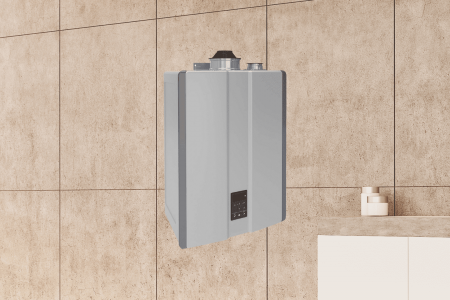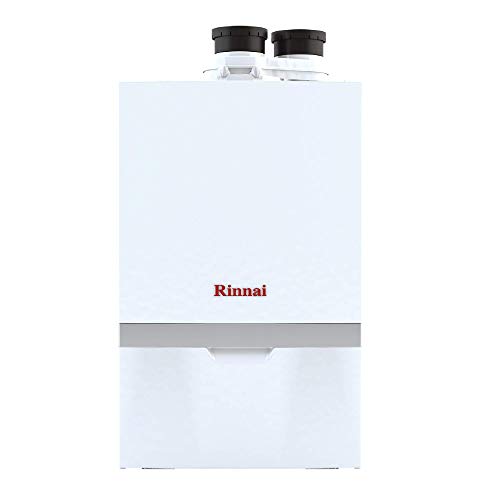When looking for a combi boiler, you want one that’s reliable, efficient, easy to maintain, and affordable to run. One of the names at the forefront of residential and commercial heating technology is Rinnai.
Rinnai boasts a century-old heritage and makes some of the market’s best combi boilers. For 2020, Rinnai revamped its combi-boiler range with two new series’ – the I series and M series – making for a total of 7 products.
Now, selecting a combi-boiler that’s ideal for your requirements can be confusing, but I will make this process easier in this article.
Here’s a list of the top 3 Rinnai combi-boilers you can get your hands on, a guide on what you should consider before narrowing down on one, along with the pros and cons of owning one.
3 Best Rinnai Combi Boilers
Like I mentioned earlier, Rinnai has combi-boilers from two series’ that are currently on sale.
To put it simply, the I series models are slightly more capable than their M series counterparts, offering better flow rates and the ability to simultaneously deliver hot water and heat your home, without interruption.
#1 Rinnai i120CN
- Whole Home and Water Heater: Heat the whole house with our tankless...
- Smart Features: This high-efficiency gas boiler's multizone control...
- Easy Interface: Our energy efficient heater has a digital display main...
- Professional Installation Recommended: Visit the Find a Rinnai PRO page on...
- Guaranteed to Last: 12-, 5-, and 1-year residential and 5-, 5-, and 1-year...
The i120CN sits at the top of Rinnai’s combi-boiler portfolio and, subsequently, this list. The model features the company’s stainless-steel heat exchanger that comes with a convenient self-clean feature.
The “120” in its name denotes that it provides an input rating of 120K BTU, while output ranges between 15,000 BTU (4.3 kW) and a very impressive 199,000 BTU (58.3 kW).
The Rinnai i120CN can be powered either with Natural Gas or Propane, and the company boldly states that its I series units has some of the most impressive Annual Fuel Utilization Efficiency (AFUEs) in the industry.
Considering its high output, it’s one of the best options out there if you’re looking to heat a large house that consists of 3 or more rooms. Concerning convenience, the i120CN offers control options with the ability to connect two-zone pumps to the PCB, and venting options including 2-inch PVC up to 65 feet.
The Rinnai i120CN is one of the more expensive models in the market, but it offers great performance and reliability.
#2 Rinnai M060CN
- Hot Water Heater: Heat the whole house with this boiler featuring a...
- Smart Features: Multizone control capability allows thermostat and...
- User-Friendly Interface: Electric heater features a digital display main...
- Space-Saving Design: Compact wall-mounted design of this water heater saves...
- Guaranteed to Last: 12-, 2-, and 1-year residential and 5-, 2-, and 1-year...
The M-series from Rinnai comprises models that are used for heating small spaces.
These units are small and can be mounted onto your wall as a replacement to conventional, older boilers. The Rinnai M-Series can heat water for up to three bathrooms, as well as the entire house, making it the perfect option for small homes or compact office spaces.
Rinnai also states that every model in the M series promises quiet operation. The M series models also get stainless steel primary heat exchangers, modulating boiler pumps for improved efficiency and performance, and easy-to-use controls.
We’ve put this M060CN in the second spot on the list because it offers adequate performance while being the most affordable model in the company’s portfolio.
Just like the I-series models, this one, too, can be fueled with either natural gas or liquid propane and this alters the output. For instance, with natural gas, the output is 17,000 BTU (4.5 kW), while with liquid propane it can range between 31,500 BTU (9.2 kW) and 103,000 BTU (30.2 kW).
#3 Rinnai i060CN
- Whole Home and Water Heater: Heat the whole house with our tankless...
- Smart Features: This high-efficiency gas boiler's multizone control...
- Easy Interface: Our energy efficient heater has a digital display main...
- Professional Installation Recommended: Visit the Find a Rinnai PRO page on...
- Guaranteed to Last: 12-, 5-, and 1-year residential and 5-, 5-, and 1-year...
The Rinnai i060CN offers the same technology as its bigger sibling that sits atop this list, albeit with lower output levels.
Other features are common with the other models in the I-series. It can be fueled with either natural gas or liquid propane, and has some of the highest fuel efficiency of any combi boiler you can find.
Similar to the models above, it features the same self-cleaning stainless-steel heat exchanger.
The reason this sits at the third spot on our list is that it offers all the above benefits, at a lower price point than the range-topping model.
How to Choose a Combi Boiler
Selecting a combi boiler that’s right for you comes down to several factors – price, specifications, warranty options, after-sales support, and, most importantly, your requirements.
When it comes to making the right choice, you should take into account the size of your home and how much water you will require. If the boiler is too small it will not be able to meet your hot water demand or house heating requirements, and if it’s too big you will end up wasting energy and spending more money on running it.
Also, take into consideration your hot water requirements. Like we mentioned above, the M series units from Rinnai offer lower levels of flow. For reference, the M060CN can provide up to 9.8 l/min, while the larger M090CN and M0120CN can do 15.9 l/min. Meanwhile, the base i060CN and i090CN offer 29.9 l/min, while the i120CN can put out 37.1 l/min.
Lastly, there’s heat loss.
The purpose of a combi boiler is defeated as most of the heat generated escapes your home. This will result in the boilers consuming more energy to reach the set heat levels and increase your electricity bills drastically.
There is a way to calculate how much heat your property is losing and a technician should be able to do so. It takes into account the area of the room, the number of radiators, doors, and windows, and the quality of insulation.
Remember, don’t buy a larger combi boiler just to compensate for heat loss. You’ll be better off eliminating or reducing the loss and then installing a unit that suits the exact requirements.
Pros and Cons of Rinnai Combi Boilers
Now, just like any other boiler on the market, no system is perfect. However, in the case of Rinnai’s combi boiler systems, the pros outweigh the cons.
- For starters, all its boilers are highly efficient (Maximum AFUE efficiency is 96.5% while the minimum is 95.7%).
- Then there’s the fact that they are compact and ideal for new homes – they can be retrofitted to replace the old tank-type models.
- The boilers are designed to work with two different types of fuel, allowing you to choose depending on what’s more easily available in your locality.
- The Rinnai combi boilers come with a range of venting options to make the installation a more flexible process; you can use stainless steel, PVC, or CPVC venting.
- Rinnai boilers are equipped with an outdoor sensor to monitor the weather and adjust performance.
- Easy to use interface – the front of the unit features a control panel that enables you to monitor boiler status, errors, and will also indicate if there is an issue that requires maintenance. This interface also allows you to control the pump and heating.
- The M-series units come with a warranty that covers the heat exchanger for 12 years, parts for 2 years, and labor costs for 1 year. Similarly, the I-series models come with a warranty that covers the heat exchanger for 12 years, parts for 5 years, and labor costs for 1 year.
The major disadvantage with a Rinnai combi boiler is that it is on the expensive side and costs a few hundred dollars more than similar options from select rival brands. They’re also rather old-school when it comes to pioneering exciting technology or features.
For instance, other combi boiler manufacturers equip their units with things like the ability to connect to a Wi-Fi network and features to mitigate impact on the environment. Then again, what you’re ultimately buying is a boiler and Rinnai’s products excel at what they’re designed to do – heat.
Rinnai makes up for this lack in exciting features by focusing it’s improvements in more fundamental areas, like improving efficiency, product life and overall performance. The company does this by using better components, and by increasing turndown ratios and AFUE ratings, equipping boilers with modulating pumps, and making models that have very low nitrogen oxide emissions.
Conclusion
Rinnai boilers are expensive, but they offer premium quality components and very efficient condensing technology. As a result, your water and house will be heated effectively and economically. These devices are compact and will not act as a hindrance to your living space.
Just make sure you use a Rinnai sizing calculator before you purchase- it’s the best investment of your time you can make,
So, if you do have the budget to spend on one of these units, you can rest assured that you’ll get your money’s worth.

Nick Lopresti is the founder of YourH2Home and a home improvement expert. He has years of experience writing about various home improvement topics, mostly as it pertains to water systems.



